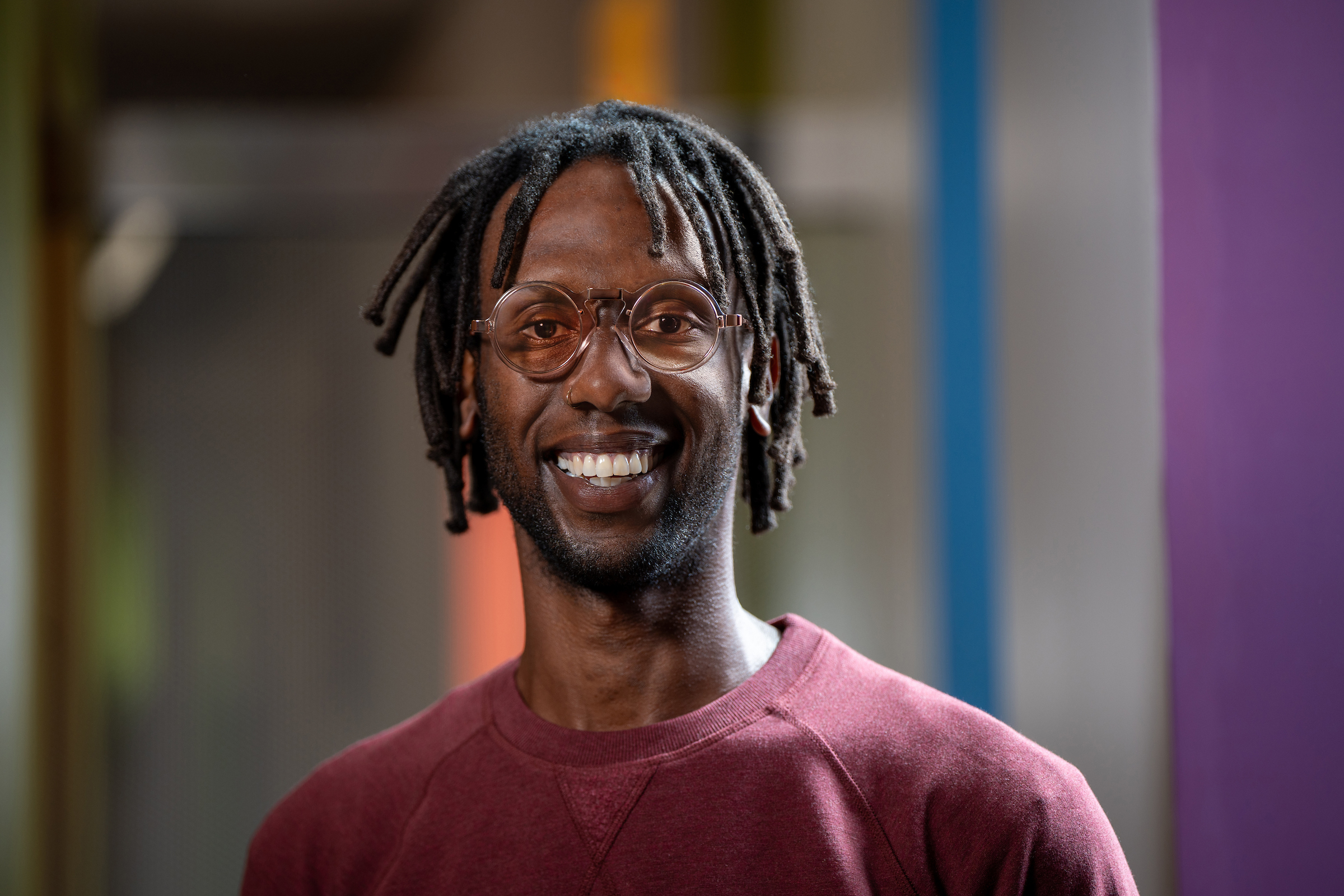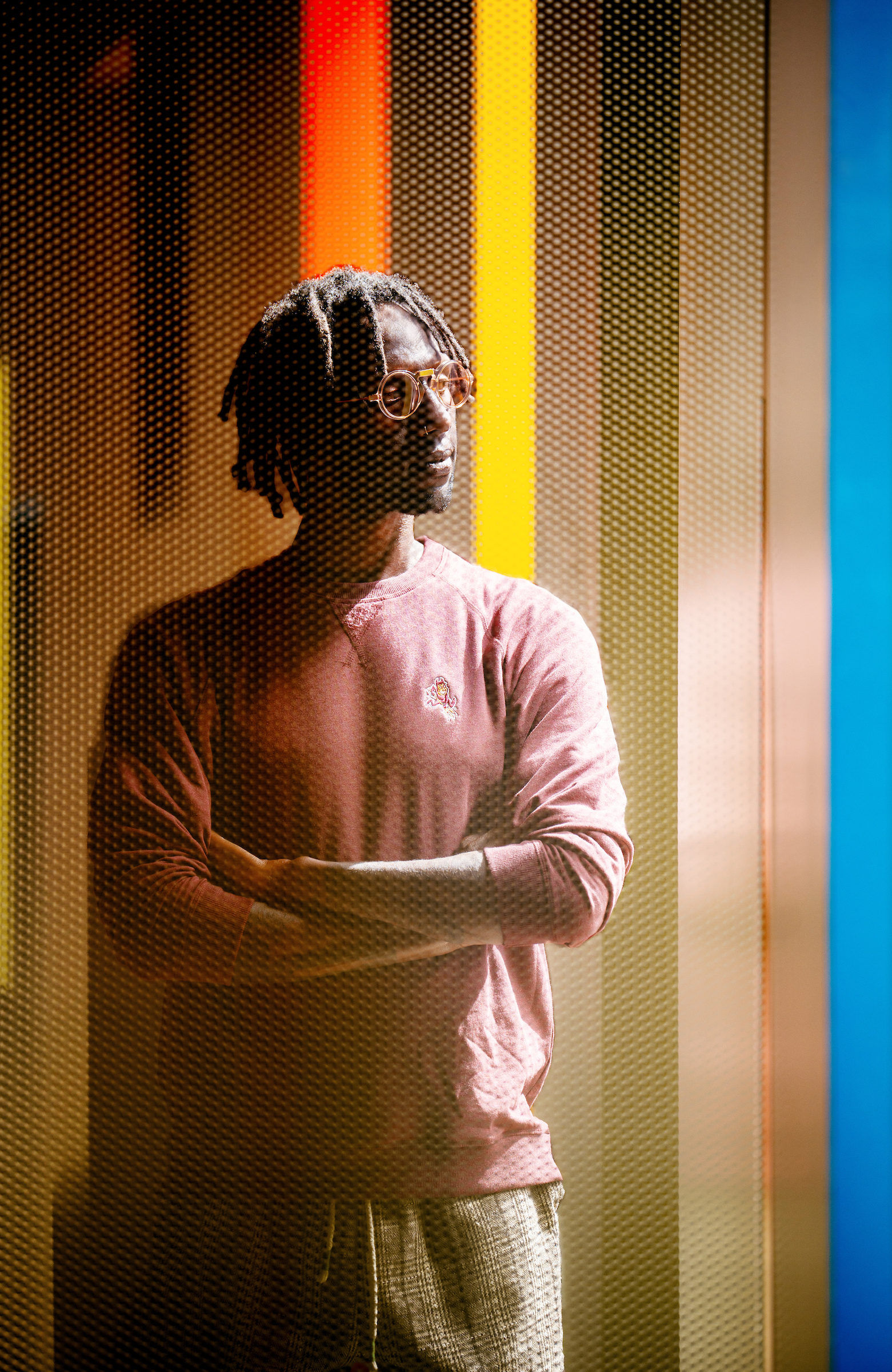
From service to style: How an ASU MBA went from Air Force to fashion entrepreneur
In celebration of Juneteenth, we caught up with Brennan Lawson (MBA '14) to find out more about his specialty eyewear company ISM Fashion House and how he builds community through mentorship, advocacy, and the arts.
Air Force veteran Brennan Lawson (MBA '14) has always been interested in entrepreneurship but never anticipated breaking into fashion.
"I wanted to launch a business, but it wasn't until I left the Air Force and took a gap year in France that I knew it would be in fashion," says Lawson, who held roles in the tech industry at Spotify and Meta before founding the boutique eyewear company ISM Fashion House in 2019. "Spending time abroad while undergoing the inevitable post-military identity transformation broadened my view of what was possible in life's next chapter."

As a Black-owned, designer-led business, ISM Fashion House focuses on androgynous eyewear and building connections through self-expression. Cultivating community is important to Lawson, who is also an advocate for affordable housing in Los Angeles, volunteers as a mentor with ASU's Center for Entrepreneurship, and co-created the Venice Soulstice, a celebration of Black expression showcasing the stories, sights, sounds, and tastes of Black culture in Venice Beach, California.
"Communities are the bedrock of our society. They are how ideas and movements are grown, and I'm happy to play even a small part in furthering the communities I care about most," says Lawson. "I wouldn't be here without the support of my family, friends, and mentors."
In celebration of Juneteenth, we caught up with Lawson to find out more about ISM Fashion House and how he builds community through mentorship, advocacy, and the arts.
Question: You are an Air Force veteran, have worked in tech, and are the founder of ISM Fashion House. How did you decide to break into fashion?
Answer: I began sketching various things — from anime to tattoo ideas to fashion accessories like eyewear — as a means of stress relief while working in the tech industry. I launched ISM Fashion House after being unexpectedly let go from my second tech job before the pandemic. After several unsuccessful months of job hunting, I took the money I'd saved for a down payment on a home and launched a business. I compiled a mood board of all my favorite vintage and contemporary eyewear styles to design my first collection, Ile de France. That's where it began.
Q: ISM Fashion House inspires others to embrace their unique identities. How does apparel and personal style impact self-expression and connection with others? What role does fashion play in building community?
A: Identity and expression are cornerstones of the human experience, and nothing plays a more visible role in shaping a person's identity than fashion. As a designer, I find the most inspiration from people who not only have a strong sense of identity but also know how to translate that identity into an aesthetic that builds their self-esteem. Something I’ve always loved about eyewear and facial accessories, in particular, is how they allow us to influence others’ first impressions at such a fundamental level. Like many brands, ISM Fashion House's goal is for our customers to discover a sense of community, and we aim to distinguish ourselves with authenticity.
Q: Has your style influenced ISM Fashion House eyewear designs?
A: Absolutely. My style embraces statement accessories like shoes, bags, and glasses alongside mostly muted apparel choices. I'm more comfortable blending in from afar while standing out up close. I designed Mont Saint Michel, the flagship product from our first collection, to be a piece that would never be in or out of style — something I'd always want to wear.
Q: What's next for ISM Fashion House?
A: We're excited to launch three new eyewear collections this year. I co-designed the pieces in collaboration with members of "ISM Family," a spotlight series we launched to highlight independent creators within our community. We're announcing several big expansions to our online retail footprint later this year, and my goal is to expand into other accessory lines as I stumble upon inspiration for them.
Q: What is Venice Soulstice, and how does it support community?
A: Venice Soulstice started as a desire to bridge communities while showcasing local Black expression and storytelling in the LA neighborhood of Oakwood, the home of Venice Beach's only historically Black community. Organizing an event this large has its bumps in the road, but sometimes those bumps create even better opportunities. For example, the city shut down our first venue unexpectedly, but we've relocated to a venue with more space and historical significance for Oakwood's Black community. Soulstice will include a lineup of musical performances, historian-led storytelling, live painting, and food vendors with ties to LA's Black community. Most importantly, we'll generate revenue that will directly fund affordable housing and community-focused projects vital to Oakwood, a community that has been ground zero for gentrification for decades.

Q: How did you get involved with affordable housing advocacy work in California?
A: Although I grew up in the suburbs, cities were one of my earliest interests. During my family's frequent long road trips between Georgia and Ohio, I was fascinated by the cityscapes we passed along I-75, like Atlanta and Cincinnati. Fundamentally, I believe cities should create economic opportunity for people, not keep it out of reach, which drives my passion for affordable housing. Living amid the California housing crisis has shaped my perspective that the easiest way to create opportunity is by lowering the cost of everyone's biggest expense: housing.
Q: How did you become a mentor for the ASU Center for Entrepreneurship, and why is it important to support young entrepreneurs?
A: I've always appreciated how W. P. Carey encourages its students to pursue entrepreneurship, and as I've matured in my career, I have found fulfillment in coaching and inspiring others. Several years ago, I contacted Jared Byrne, director of the Center for Entrepreneurship and New Business Design, about getting involved. The timing couldn't have been better because the Founders Lab — a Barrett, The Honors College "thesis incubator" within the Center for Entrepreneurship — was starting up and needed mentors. I began my entrepreneurship journey while pursuing my MBA at W. P. Carey, where I developed a business framework for a crowd-funding platform focused on urban infill development. The plan had potential, but my team lacked the resources to execute it. When I saw the opportunity to give some of my time to a structured mentorship program full of talented and ambitious Barrett students, I jumped at it.
Q: What advice would you give young people interested in supporting their community?
A: Identify your values through the lenses of the communities you're involved in while focusing on grassroots-level impact.
Latest news
- Artificial intelligence in business master's degree helps Nathan Merriman combine business strategy with technology
Nathan Merriman (MS-AIB '25) had been working in business for a few years when he learned about…
- How the Executive MBA empowered Scott Gates to be a mission-driven leader
Scott Gates (BS Marketing '04, Executive MBA '15) had a very positive experience during his…
- Fall 2025 W. P. Carey Dean's Medalists honored at celebratory luncheon
Top grads from each program recognized for academic excellence and lasting impact on the ASU…